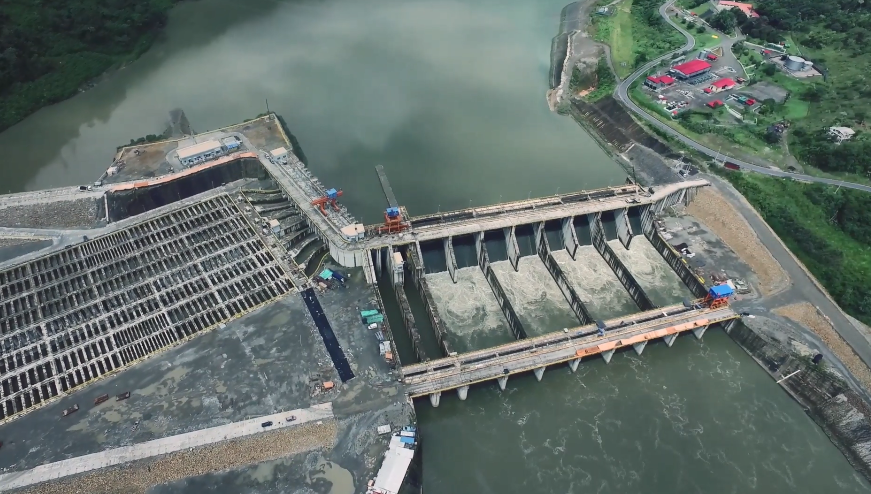
The Minister of Energy and Mines of EcuadorFernando Santos Alvite, held a meeting with representatives of the hydroelectric plant construction company Coca Elbow SinclairPowerChina International Group Limited seeking to resolve the inconveniences in the construction and completion of the contract.
PowerChina is one of the main construction companies in the Asian country in the electricity sector, together with Gezhouba of the Energy China group, it has a global presence in more than 130 countries and its parent company is Sinohydro. The company was in charge of the construction of Coca Codo Sinclair, where it has faced significant challenges in infrastructure, following failures in the work itself.
The construction of this plant, whose cost exceeded USD 3,000 million, has experienced problems such as the appearance of various cracks in the hydroelectric plant’s distributors, as well as regressive erosion in the Coca River, which represents a threat to the project.
According to various reports local mediathe Government of Guillermo Lasso and the parent company Sinohydro are working together to seek an amicable solution to the deficiencies detected at the plant.
China and “good imperialism”
The Minister expressed his hope that the plant would operate properly and that the identified problems would be resolved. For his part, the president of PowerChina, stated that they are looking for solutions so that the plant is “safe and operational” in the shortest time possible.
And report of the Center for International Private Enterprise (CIPE) on the impacts of corrosive and constructive capital on investments in Latin America, highlights that among the main problems of Coca Codo Sinclair is the lack of adequate feasibility and risk studies for a work of this caliber.
According to CIPE, “the only feasibility studies were carried out more than a decade before construction began in 2006.” The hydroelectric plant began operating in 2015, but “despite government claims that the facility has been operating at full capacity since 2021, private groups have pointed out serious deficiencies in the infrastructure that could put its production at risk,” notes the report.
The CIPE also highlights that the construction of Coca Codo Sinclair has been the subject of controversy due to frequent interruptions caused by damage to the intake structure, as well as environmental impacts, including erosion in surrounding areas.
In April 2020, erosion resulted in a sinkhole that caused the Trans-Ecuadorian Pipeline and the Heavy Crude Oil Pipeline to rupture, causing a spill of more than 15,000 gallons of oil into the Coca River and affecting the indigenous communities in the area.
The reality is that the work, which was contracted during the government of Rafael Correa, absolutely exceeded the tendered prices, as well as failed to comply with the contract times. “The total cost of the project exceeded USD 3 billion, and a considerable part of its financing came from a credit granted by the Export-Import Bank of China,” CIPE reports.
Ecuador’s external debt has been problematic in recent years, in fact the country has had to restructure its debt with China, its main creditor. The agreement was reached directly with the Chinese political banks, the China Development Bank and the Export-Import Bank of China, which together have provided more than $18 billion in loans to Ecuador since 2010, with the financing contract being for the Coca Codo Sinclair project one of the main ones.
What role do Chinese banks have in Latin America and the Caribbean?
This problem is not unique in Latin America, since cases called “corrosive capital” have been identified in various strategic sectors in countries such as Argentina, Bolivia, Chile, Ecuador y Venezuela. A similar case to that of Coca Codo Sinclair, for example, has happened in Argentine Patagonia with the project, led by Gezhouba, of the Cóndor Cliff and La Barrancosa hydroelectric plants: technical problems of the project, added to enormous time delays and increased considerable costs.
These cases usually involve investments and management by Chinese companies, in a context in which Chinese investment in Latin America has experienced notable growth in recent decades. In addition to China, other countries, such as Iran y Russiahave also played a role in the phenomenon of corrosive capital in the region.
Ecuador and PowerChina representatives will continue to work together to address these challenges and guarantee the safety and operation of the Coca Codo Sinclair Hydroelectric Plant in the future, although the environmental and economic damages seem to have no return.
Source: https://reporteasia.com/negocios/energia/2023/09/12/ecuador-powerchina-coca-codo-sinclair/

